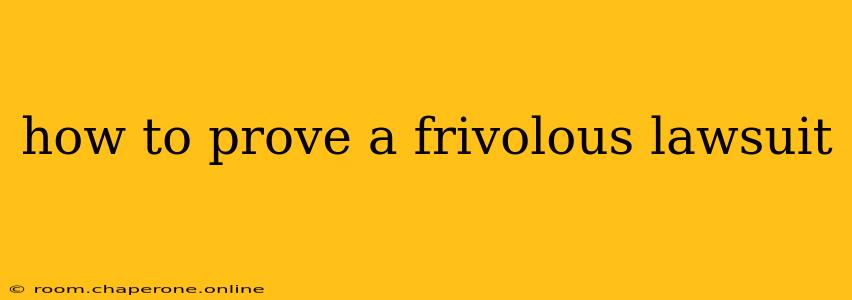Facing a frivolous lawsuit can be a daunting experience, consuming time, resources, and emotional energy. Understanding how to effectively demonstrate the frivolous nature of such a suit is crucial for protecting yourself and your interests. This guide outlines strategies and considerations for proving a lawsuit lacks merit.
Understanding "Frivolous" in a Legal Context
Before diving into strategies, it's essential to define what constitutes a frivolous lawsuit. Generally, a frivolous lawsuit is one that lacks any reasonable basis in law or fact. This means the plaintiff's claims are baseless, unsupported by evidence, or demonstrably contrary to established legal precedent. Judges have significant discretion in determining whether a lawsuit is frivolous, often considering factors like:
- Lack of legal merit: The claims asserted are not recognized under applicable law, or the plaintiff fails to state a valid legal claim.
- Lack of factual basis: The plaintiff's allegations are not supported by evidence or are demonstrably false. This includes a failure to produce evidence to support their claims or relying on demonstrably false testimony.
- Improper purpose: The lawsuit is filed for an improper purpose, such as harassment, intimidation, or to gain an unfair advantage, rather than to seek legitimate legal redress.
- Bad faith: The plaintiff knowingly filed the lawsuit with no reasonable expectation of success.
Strategies for Proving a Frivolous Lawsuit
Proving a lawsuit is frivolous requires a multi-pronged approach, focusing on both legal and factual arguments. Here are some key strategies:
1. Motion to Dismiss: Your First Line of Defense
A Motion to Dismiss is often the initial step in challenging a frivolous lawsuit. This motion argues that even if all the plaintiff's allegations are true, they still fail to state a legally cognizable claim. This motion is typically filed under Rule 12(b)(6) of the Federal Rules of Civil Procedure (or equivalent state rules). Success hinges on demonstrating the inherent weakness of the plaintiff's legal arguments.
2. Demonstrating Lack of Factual Basis
This involves meticulously refuting the plaintiff's factual assertions. This may involve:
- Presenting contradictory evidence: This could include documents, witness testimony, or expert opinions that directly contradict the plaintiff's claims.
- Highlighting inconsistencies: Pointing out inconsistencies in the plaintiff's statements, evidence, or timeline can severely weaken their case.
- Exposing fabricated evidence: If the plaintiff's evidence is fabricated or forged, this must be aggressively challenged and exposed.
3. Showing Improper Purpose or Bad Faith
This is often more challenging to prove but is crucial in demonstrating the frivolous nature of the suit. Evidence of harassment, intimidation, or a clear attempt to exploit the legal system can significantly bolster your case. This might include:
- History of similar lawsuits: A history of the plaintiff filing numerous baseless lawsuits could indicate a pattern of bad faith litigation.
- Exaggerated damages claims: Demanding grossly inflated damages can be evidence of an improper purpose.
- Lack of communication or attempts at resolution: A plaintiff’s refusal to engage in reasonable attempts to resolve the dispute outside of court could suggest bad faith.
4. Seeking Sanctions
If successful in proving the lawsuit is frivolous, you can request the court to impose sanctions on the plaintiff and/or their attorney. Sanctions can include monetary penalties, payment of legal fees, and even disciplinary action against the attorney.
Seeking Legal Counsel: Crucial First Step
Navigating the complexities of proving a frivolous lawsuit requires experienced legal representation. A skilled attorney can help you strategize, gather evidence, and effectively present your case to the court. Don't hesitate to seek legal advice early in the process. The sooner you act, the better your chances of efficiently resolving the matter.
Disclaimer: This information is for educational purposes only and does not constitute legal advice. Consult with a qualified attorney for advice tailored to your specific situation.

